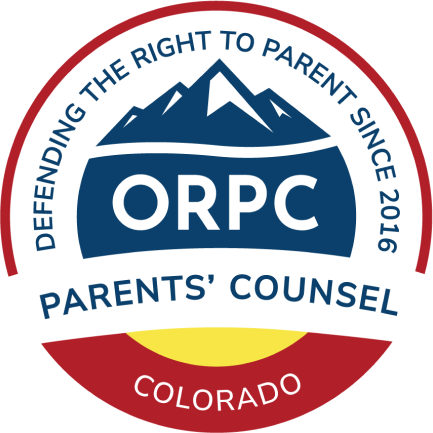Colorado Program Evaluation Highlights the Inclusion of Social Workers on Interdisciplinary Legal Teams for Parents in Child Welfare Cases
Results in Children Returning Home or Staying with Family at Higher Rates
FOR IMMEDIATE RELEASE
November 4, 2019
DENVER, Colorado – The right kind of legal representation in child welfare cases can mean the difference between preserving a family and seeing it permanently dismantled. Colorado is pursuing a nationally recognized legal model of pairing attorneys with social workers to represent parents facing child welfare cases. Colorado’s Office of Respondent Parents’ Counsel (ORPC) piloted interdisciplinary teams for parents facing high risk dependency and neglect cases in three judicial districts with promising results.
The ORPC’s mission is to protect the fundamental right to parent by providing effective legal advocates for indigent parents in child welfare proceedings. This right is protected when a parent has a dedicated advocate knowledgeable about child welfare laws and willing to hold the state to its burden. The office’s duties are to provide accountability, training, and resources, develop practice standards, and advocate for systemic and legislative changes in Colorado.
To this end, the ORPC started a Social Work Pilot Program (SWPP) in July 2017 with the goal of enhancing legal representation for parents and seeking to replicate the success of other states that utilize this model. Attorneys’ access to social workers is recognized as a best practice by the American Bar Association’s Center on Children and the Law and encouraged by the Children’s Bureau, an Office of the Administration for Children and Families, U.S. Department of Health and Human Services.
The pilot program assigned social workers to parent legal defense teams when a parent’s case included an out of home removal for at least one child under the age of six. For those children, Colorado statute requires 12 months to plan for reunification, adoption or permanent custody to a relative unless the court grants a limited extension.
The initial program evaluation was conducted by Metropolitan State University of Denver Department of Social Work. They reviewed closed case data for 128 child welfare cases (including 207 children) in three Colorado counties – El Paso, Mesa and Adams. Cases were filed and closed in the court system between July 2017 and September 2019. The researchers utilized aggregate data to compare the pilot program’s outcomes with each county’s average outcomes for families. The initial findings indicate that the interdisciplinary model of attorney-social worker teams positively impacted outcomes for families in Colorado that are consistent with national data.
Across the three piloted judicial districts, parents who received interdisciplinary legal representation saw their children spend fewer days out of the home and their families reunify at higher rates than county averages for the same type of child welfare dependency and neglect cases. Children whose parents received the interdisciplinary team representation in the pilot counties spent an average of 141 days in out of home care, compared to the county’s average of 172 days – a month longer – in out of home care. Reunification rates overall were nearly 22% higher than the county average for children when parents had interdisciplinary representation.
Colorado is committed to providing high quality legal representation to families involved in the child welfare system. The ORPC, in its legally mandated capacity to oversee effective parent representation, seeks to implement best practices that are well supported by national research and to support Colorado families in staying together safely or obtaining family support when navigating the child welfare system. This initial program evaluation shows that Colorado is on the right track.
You can view the entire evaluation here.


